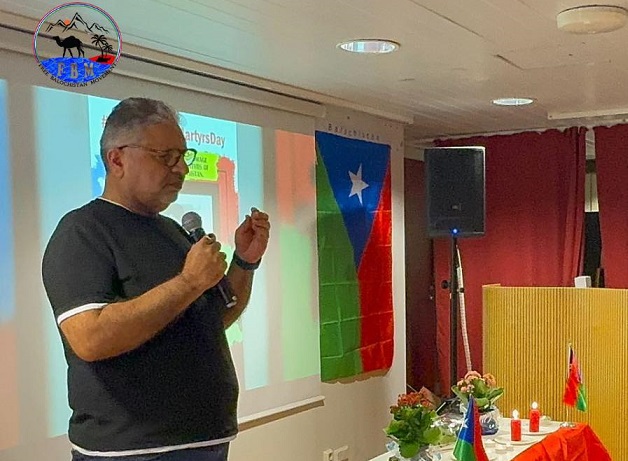Indian State Should Focus on Unconventional Methods: Jamal Nasir Baloch
Nationalism: Its Concepts and Variants

By Advocate Sadiq Raisani
There are many concepts of nationalism in contemporary discourse. Generally, nationalism is understood simply as “the loyalty, love, and devotion of a citizen to their nation.” However, the term “nationalism” is now used in both positive and negative contexts, making it essential to examine this political concept more deeply, within its proper historical framework. Nationalism is a social, political, and economic ideology or movement aimed at promoting and protecting the interests of a specific nation. Its goal may be to achieve or safeguard national identity and sovereignty.
Nationalism asserts that a nation should have the right to govern its own territory. It advocates for freedom from external interference and an unconditional right to self-rule. The primary objective of nationalist movements or ideologies is to establish a national identity based on shared culture, language, history, and traditions.
This straightforward notion of nationalism becomes more complex when it intersects with other political ideologies. When combined with conservative views, nationalism can take on a narrow, reactionary form. It may also transform into socialist nationalism when influenced by left-wing socialist ideas. At a more progressive stage, this ideology can even embrace internationalism or global cooperation.
Nationalism is a relatively modern concept in history. While some aspects of the ancient Roman Empire and other major empires were based on nationalist ideas, most empires consisted of multiple regions and nations. These vast empires spanned many peoples and territories, and though the dominant ruling class often belonged to a single race, religion, or social group, they did not emphasise nationalism in the modern sense.
The emergence of nationalism as a significant political force can be traced back to the American and French revolutions of the 18th and 19th centuries. During this period, nations began to unite based on shared economic and political interests. Thinkers like Jean-Jacques Rousseau contributed to the development of nationalist thought, while politicians like Napoleon in France and Bismarck in Germany promoted these ideas and unified their respective nations.
However, alongside nationalism, ideas of racism and national superiority also gained ground. In the economic and political crises of the 20th century, these ideas evolved into dangerous ideologies. From this, fascism and Nazism emerged, exploited by leaders like Mussolini and Hitler, who used concepts of national identity, superiority, and tradition as tools to inflict destruction.
There are many types and interpretations of nationalism. Racial nationalism defines a nation as a group of people sharing a common race, heritage, and culture. While closely related to racism, there is a subtle distinction between the two, though this distinction is often blurred. Racial nationalism is also closely linked to tribal nationalism, though they are not entirely the same.
Citizenship-based nationalism involves individuals who share common citizenship, values, and institutions. This form of nationalism aligns with constitutional patriotism and is exemplified in Jean-Jacques Rousseau’s The Social Contract. A manifestation of this civic nationalism is state nationalism, which can sometimes merge with racial nationalism to form a dangerous combination. An example of this is Italian fascism, where Mussolini proclaimed, “All within the state, nothing outside the state, nothing against the state.”
Expansionist nationalism is another variant. It is driven by the desire to incorporate other regions into one’s state, often under the banner of national greatness and historical destiny. Examples of this form include fascist Italy, Nazi Germany, the Japanese Empire, and other historical examples like ancient Albania and Serbia. This nationalism denies the self-determination of other nations, subjugating them in the name of national superiority.
Radical or revolutionary nationalism is based on a common purpose and shared goals. In the early 20th century, such nationalist tendencies were prevalent in France and Italy. In modern times, many countries in the Global South have seen the rise of revolutionary nationalist movements.
Separatist movements also tend to have nationalist characteristics, but not all separatist movements are inherently nationalist. Some arise from political and economic conflicts, regional inequalities, and grievances, where a group seeks independence. However, such demands for independence do not always equate to nationalist aspirations.
Marxist-Leninist nationalism is another variant, viewing nationalism through a global lens without racial, religious, or regional discrimination. This concept upholds the right of nations to self-determination and promotes unity within an international framework. This form of progressive nationalism aligns closely with left-wing or socialist nationalism.
Liberal or progressive nationalism aligns with liberal values such as freedom, tolerance, and equality. Thinkers like Ernest Renan and John Stuart Mill have been influential proponents of this form.
Historically, nationalism has played a dual role. On the one hand, it has been a force for positive change, inspiring revolutions and movements for self-determination. On the other hand, it has also led to negative outcomes, such as racism and tragic events like the Holocaust. Nationalism retains this dual nature today, with various manifestations around the world, requiring constant vigilance.
The formation of a nation stems from a unifying force, whatever that force may be. The critical condition is that this force must be powerful enough to unite people with differing views toward a common goal. It must bring together the diverse elements of a nation, forging them into a unified whole. This unity should be so strong that it dominates the hearts and minds of citizens, making them committed to national interests and willing to sacrifice for the nation.









